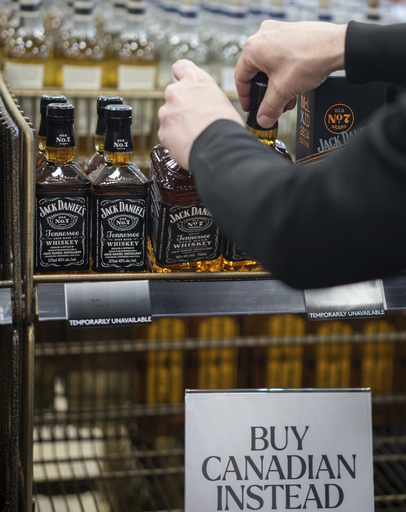
NEW YORK — A variety of companies from diverse sectors are experiencing a downturn in their stock prices on Wall Street, primarily due to tariff threats issued by President Donald Trump. Automakers, technology firms, and retailers are among those affected as discussions regarding tariffs among the U.S., Canada, Mexico, and China continue. Over the weekend, Trump announced that a 25% tariff on imports from Canada and Mexico would take effect on Tuesday, alongside a 10% tariff on imports from China. However, the tariffs on goods from Mexico have been postponed for a month to facilitate ongoing negotiations.
The automotive industry is particularly vulnerable, facing significant disruption. Many companies in this sector have operations that heavily depend on the international supply chain impacted by tariff decisions. Major auto manufacturers experienced substantial stock price declines; General Motors decreased by 3.3%, while Ford saw a drop of 2%. Stellantis reported a 3.9% decrease, and Tesla experienced a 6.1% decline. According to S&P Global Mobility, over 22% of light vehicles sold in the U.S. in 2024 were imported from Mexico. General Motors reports that around 22% of its vehicles originate from Mexico, while Ford sources about 15% from the same country.
The threat of tariffs is also negatively influencing auto parts suppliers. Visteon, which has critical business ties with manufacturers like Ford, General Motors, and Volkswagen, saw its stock decline by 4.2%. Other auto parts companies also suffered; Aptiv dropped 3.7%, and Goodyear Tire fell by 3.8%.
The beverage sector, including liquor and beer producers, is experiencing stress due to the prospect of tariffs. Authorities in numerous Canadian provinces have started retaliating by planning to remove American liquor brands from their government-controlled stores. For instance, Constellation Brands, known for importing Corona and Modelo beer into the U.S. from Mexico, fell by 2.6%. This company is particularly affected by trade negotiations as it holds exclusive importing rights, while AB InBev, the owner of these beer brands, saw its shares drop by 1%. Additionally, Molson Coors, the maker of popular beers, saw a decline of 1.8%, whereas Brown-Forman, the distributor for Jack Daniels, fell by 2.4%. Diageo, which owns several well-known liquor brands, also faced a 1.8% decrease.
The technology sector is feeling the strain from these tariff announcements, particularly among big tech firms that have driven recent market highs. This sector is grappling with increased competition from China’s DeepSeek artificial intelligence company, adding further pressure. Leading firms such as Nvidia, a major semiconductor manufacturer, faced a 3.3% stock decline, while Apple, renowned for its iPhones, saw a 3.9% decrease. Both companies are significantly reliant on China for production and sales, with Nvidia obtaining nearly 39% of its revenue from China and Apple sourcing about 16% of its income from the same market, according to FactSet.
Retailers, especially in the apparel and consumer goods sector, are also affected by potential tariffs. Many of these retailers depend on cheap imports from China and Mexico to keep prices low for consumers. Nike’s stock fell by 1.6%; the company manufactures 22% of its finished products and sources 30% of its raw materials from China, with merely 4% of its products produced domestically. Electronics retailers like Best Buy, which depend on products manufactured abroad, witnessed a decline of 2.9% in stock value.
Finally, homebuilders are facing increased costs due to the potential rise in prices for lumber and other building materials, as Canada is a significant exporter of timber to the U.S. Companies involved in home construction, like Lennar and Toll Brothers, experienced declines of 3% and 2.9%, respectively.

